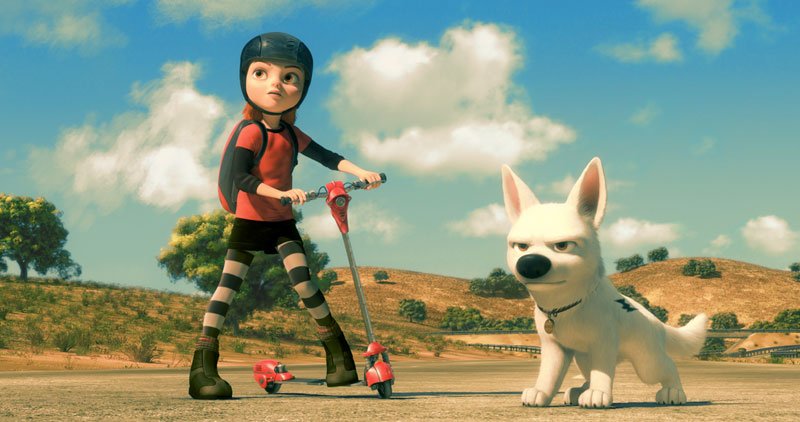There's no doubt about it- "Bolt" is great family entertainment, bolstered by bright, engaging animation and likable characters. My only worry is that people will shy away from this movie because of some irrational hatred from one of the voice actors, Miley Cyrus. Well, let me put your mind to rest folks- Penny (voiced by Cyrus) is not even the lead, and in the scenes she is in she does a fine job, and in actuality, does not make you want to put your head through a wall, although her singing might be a different matter.
John Travolta voices the eponymous character, a white German Shepherd who is adopted and taken home by a little girl, his little girl, who as it comes to pass, becomes the star of a very lame television show. In the show, Penny plays a prepubescent badass who fights the evil Doctor Calico (voiced by Malcolm McDowell) as his minions side by side with the genetically engineered Bolt.
The catch- Bolt, who has been duped by camera tricks and showbiz gimmicks, thinks the show is real, and fights every new episode to save his beloved Penny. The director (voiced by James Lipton,) in order to evoke convincing acting from the job, refuses to take multiple takes and never lets Bolt of the set of the TV show, much to Penny's dismay.
When Bolt is accidentally shipped off to New York City in a cardboard box, he must face real-world consequences for his confused behavior. For the first time he bleeds, he becomes hungry, and he is separated from Penny. It is there he meets Mittens (voice of Susie Essman,) a streetwise alley cat whose fate becomes entangled with Bolt's. The scenes introducing Mittens are hilarious and cleverly conceived.
The next addition to the group, Rhino the hyperactive hamster (voice of Mark Walton,) makes things a little silly but his goofiness will please kids and the young at heart. Mittens wants Bolt to stay with her, but Bolt insists on journeying on to find Penny, which leads to an exciting and emotional finale.
I loved the characters in this movie, and this bears up to multiple viewings. It's touching, but doesn't tear you up (like "The Fox and the Hound," which reduces me to tears) and isn't too scary or dark for kids. I also liked the fact that they made Penny's mother overweight without adding any fat jokes or showing her eating a cheeseburger in every other scene. The movies need more positive portrayals like that.
"Bolt" is a very cute movie that should charm audiences of all ages, especially animal lovers. I don't recall a single potty-related or off-color joke, although some of the showbiz satire should go over the heads of kids. A must see family film!
Rating-
8.0/10














